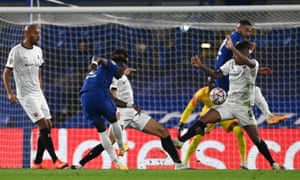There was a chilling moment during BT Sport’s coverage of Chelsea v Rennes on Wednesday night. A laughably punitive penalty kick had just been awarded against Rennes defender Dalbert Henrique. In the same flourish, Henrique also received a second yellow card for the crime of existing near a football while in possession of standard human arms.
As Dalbert trudged off looking sad, Darren Fletcher expressed some reservations on commentary about the justice of all this. “You might not like it Darren,” former referee Peter Walton replied, with an air of calm, vengeful assurance. “But it’s the law.”
The words seemed to hang in the air, to echo along some fresh and vital faultline. Let’s be clear, and with all due deference to Peter Walton, it’s not actually the law. The laws of football, so prissily insistent on their status, are not laws in any meaningful sense of the word. They’re transient things conjured into existence to give temporary shape to a game of ball-kicking. They’re stuff that some blokes have written down.
This isn’t meant as a personal criticism of Walton, who comes across on TV as an agreeable, well-informed figure, delivering his pronouncements with the quietly haunted air of a minor civic official being held captive by off-screen assailants and forced at gunpoint to talk in a slow, steady voice about degrees of contact and the unnatural positioning of arms.
The point here is the weird fetishising of the penalty kick itself, the insistence that every achievable penalty kick must be awarded, on a granular strict liability basis. And that this previously hidden river of evil – the unseen microfoul, the handball microcrime – must be purged from the sporting world by a new class of tooled-up refereeing superhero.

Penalties have become a problem. There are, simply, too many of them. 36 penalty kicks have been awarded in the Premier League. All things being equal this would lead to a total of 195 across the season, double the standard tally, and a ludicrous 103 more than last year. At the end of which one needs-must part of football, a tool to fix a problem, is threatening to overwhelm all the other working parts. The award, dispute, taking and retaking of penalties is the biggest growth area in the elite game. The penalty kick has won. It’s a star – something that is both tedious in practice and a symptom of more profound textural change elsewhere.
This is not about the handball law, which is poorly adapted to the new reality and continues to create weird outcomes. These can be fixed. Serie A also had a record 187 penalties last year. But dig down and, as in England, the key driver is stupid fiddly fouls, not the more headline-grabbing stupid fiddly handballs. The issue isn’t VAR either, which will solve itself, and whose future lies in refinement, AI and more competent human handlers. The problem, for now, is penalty dominance, penalty culture, the penalty supremacy. We just need fewer of them.
It is worth recalling the basic point of a penalty kick. Penalties are a piece of artifice, a quick fix for a glitch in the machine. Penalties are what happens when football runs out of things to say. Not only does a penalty kick have no textural relationship to every other part of football – one kick at goal, in the middle of all these moving variables – it often distorts rather than reflects the flow.
There are good penalties, those that arrive out of the natural justice of a hard-earned attacking overload. Equally there are penalties that divert or independently decide the outcome. We may remember here the late penalty awarded to Manchester United at Paris Saint-Germain in March 2019, where a hopeful shot struck a hand while the ball was heading wide of goal.
A penalty kick awarded for a non-crime that affected nothing turned a creditable away goals defeat into a miraculous United win. A false narrative of promise and progress was born. From there came the permanent hiring of a manager who won five of his next 24 games and still looks genuinely surprised to be asked questions about the internal workings of Manchester United FC each time he appears in public.
More alarming is the way penalty culture is changing the way the game is played. There are matches where trying to draw a trip or strike a hand feels like the simplest route to victory, players whose value has been significantly boosted by cleverly refined penalty winning skills.
So much attacking play feels stilted and loose. Watch as Player A slaloms his way across the penalty area, Maradona-style, while his opponents Michael-Flatley away from him. Is this authentic? Is a wonder goal really a wonder goal when skilled defenders are reduced to bouncing around with their arms behind their back like a troupe of skinheads dancing to Jimmy Cliff? Some will find this staccato, interventionist style more to their liking. Those who yearn for completeness and perfectibility will see it as progress. Others will see a tepid tyranny of detail.
My own dislike of video refereeing has always been an emotional, semi-rational thing, based in the idea that football is one of the last remaining free collective experiences, unfiltered through a screen, unmediated by invisible hands. Football is a real-time gymnastic art, not a tech-driven quest for deep refereeing truths.
What is certain is this is something different, a step-change as the sport adapts to its status as a purely televisual product. My own compromise would be a clearly defined stiffening of the weight of evidence required to award a penalty kick, a higher bar for the ultimate sanction of the law. Walton’s literal-minded bunker of truth is a powerful voice in this process. For now it has, without warning or discussion, become the defining one.
from Football | The Guardian https://ift.tt/2I7bWjf
via IFTTT

No Comment